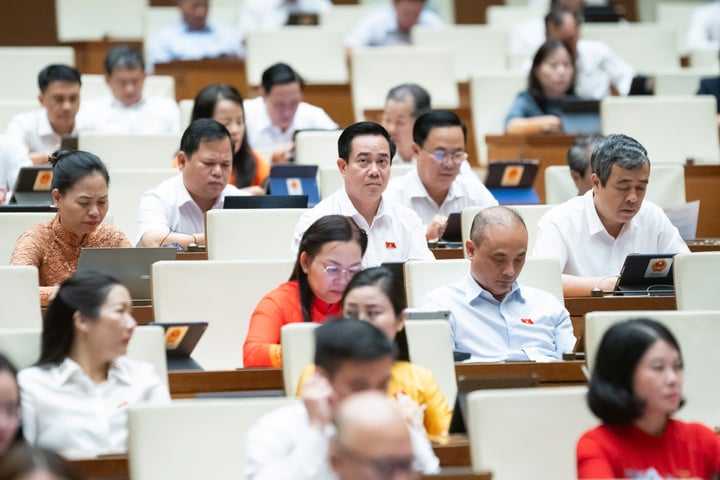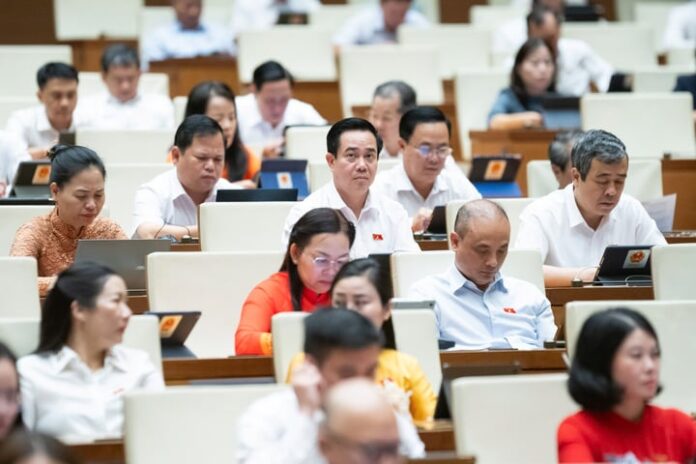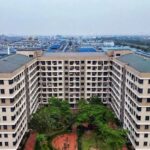The Government submitted to the National Assembly a report on the adoption, explanation, and editing of the draft Resolution of the National Assembly on piloting some mechanisms and special policies for social housing development.

Delegates attending the 9th session of the 15th National Assembly. (Photo: quochoi.vn)
Notably, the draft Resolution has been adjusted after adoption regarding the conditions for social housing support (Article 9).
The content related to the post-merger housing support policy for officials and civil servants who have to commute more than 30km to work received much discussion from the National Assembly deputies.
In the report on adoption and explanation, the Government stated that some opinions questioned the distance from home to the workplace as it is often not fixed. It is suggested that social housing should be linked to family needs, and thus, the minimum distance from home to the social housing project should be adjusted to 30km or more.
There were also suggestions to remove the 30km regulation when purchasing social housing, proposing flexible alternatives regarding distance or commute time, and considering each case’s actual circumstances.
Some delegates proposed that the People’s Committee of the province should specify housing conditions for cases with private housing but far from the workplace. At the same time, they should clarify the conditions for enjoying social housing, with transparent approval mechanisms, digitization, and local responsibility for beneficiary verification.
Many other delegates suggested expanding the conditions for enjoying social housing, giving priority to stable local workers. They proposed that those who lack projects in their locality should be allowed to buy/rent social housing elsewhere with confirmation from the agency.
According to the delegates, the Government should assign the Chairman of the Provincial People’s Committee to make suitable regulations for each region. Regarding the second point, the distance should be shortened for the convenience of workers, referring to international experience (for example, 5-10km). In Hanoi and Ho Chi Minh City, the distance should be reconsidered due to traffic congestion.
The Government edited the draft Resolution to align with the actual conditions of each locality. The Provincial People’s Committee is responsible for specifying housing conditions to enjoy social housing support policies for those who own houses but live far from their workplaces.
Another issue that attracted the attention of many deputies was the establishment of the National Housing Fund (Article 4). The Government reported that many opinions agreed and requested clarification on the Fund’s operating model, legal status, functions, tasks, and operating principles.
Deputies proposed clarifying the relationship with similar funds, revenue and expenditure sources, avoiding overlap with the state budget, socialized capital financial mechanisms, allocation criteria, supervision, accountability, management agency, financial transparency, and independent supervision. They also suggested criteria for selecting priority projects.
The Government edited the draft Resolution to clarify the legal status and organizational model of the Fund. Accordingly, the National Housing Fund is a state financial fund outside the budget, with legal personality and non-profit purposes. It consists of the Central Housing Fund established by the Government and the Local Housing Fund established by the Provincial People’s Committee.
The Government also edited the provisions on the Fund’s objectives and tasks, investing in the construction of social housing and technical and social infrastructure for social housing projects, creating social housing, and housing for rent by officers, officials, public employees, and laborers.
At the same time, the contents of the Fund’s tasks, scale, and other details will be clarified in the Decree detailing this Resolution to ensure that the tasks are consistent with the Fund’s objectives and activities.
The Government also edited the provisions on the sources of capital for the National Housing Fund, including the state budget, money deducted from land funds for investing in technical infrastructure construction of social housing, proceeds from the sale of public housing, land auction proceeds, voluntary support from domestic and foreign sources, and other legal sources. The Government will clarify and detail the arrangement of these capital sources.
According to the agenda, in the afternoon of May 29, the National Assembly will vote to approve the Resolution on piloting some mechanisms and policies for social housing development.
The Latest Regulations on Sales Prices and Beneficiaries of Social Housing Policies
The determination of sales and leasing prices for social housing is undertaken for one or multiple constructions within a social housing development project. This process is undertaken in phases, considering the investment stages and either individual components or the entirety of the project.
‘The Dark Side of Social Housing: How ‘Cò’ Profiteers are Distorting the Market’
“There is a persistent presence of brokers in the social housing sector, taking advantage of the high demand for such housing and creating a chaotic market with their resale practices. Mr. Nguyen Van Khoi, Chairman of the Vietnam Real Estate Association, highlights how these practices cause significant distress for legitimate buyers seeking social housing.”
Why Are Hanoi Apartment Prices Soaring?
The soaring prices of apartments in Hanoi can be attributed to the high input costs of developing a commercial residential project. Land costs, which account for 25% of the total project cost, surge to 40-50% for prime locations. Additionally, construction costs have been on a steep upward trajectory recently, further contributing to the overall expense.





















